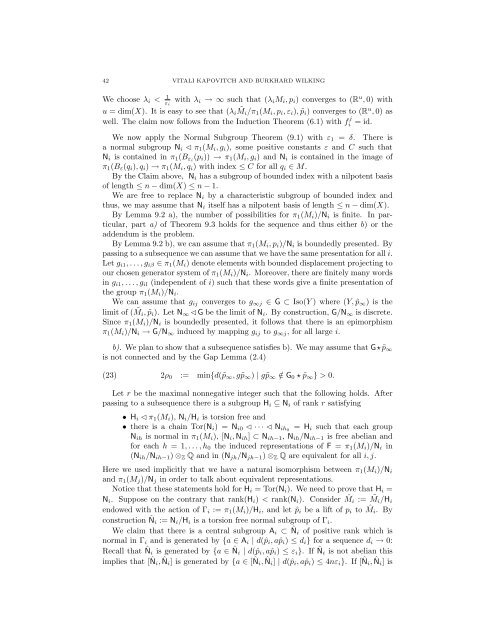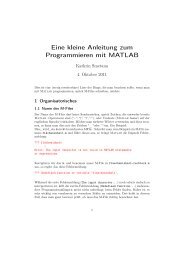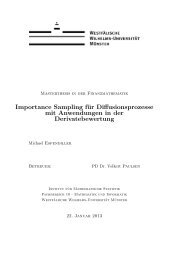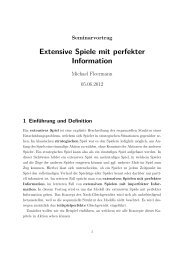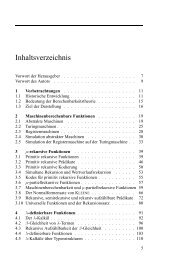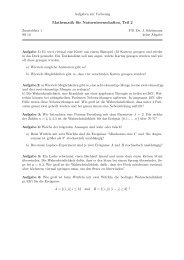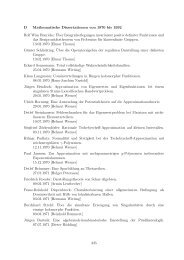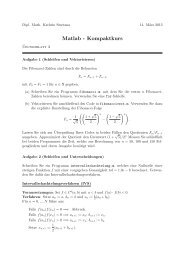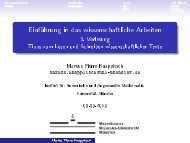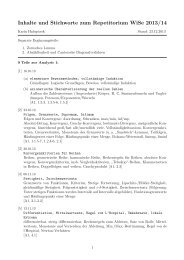Margulis Lemma
Margulis Lemma
Margulis Lemma
Create successful ePaper yourself
Turn your PDF publications into a flip-book with our unique Google optimized e-Paper software.
42 VITALI KAPOVITCH AND BURKHARD WILKING<br />
We choose λ i < 1 ε i<br />
with λ i → ∞ such that (λ i M i , p i ) converges to (R u , 0) with<br />
u = dim(X). It is easy to see that (λ i ˜Mi /π 1 (M i , p i , ε i ), ˜p i ) converges to (R u , 0) as<br />
well. The claim now follows from the Induction Theorem (6.1) with f j i = id.<br />
We now apply the Normal Subgroup Theorem (9.1) with ε 1 = δ. There is<br />
a normal subgroup N i ⊳ π 1 (M i , g i ), some positive constants ε and C such that<br />
N i is contained in π 1 (B εi (p i )) → π 1 (M i , g i ) and N i is contained in the image of<br />
π 1 (B ε (q i ), q i ) → π 1 (M i , q i ) with index ≤ C for all q i ∈ M.<br />
By the Claim above, N i has a subgroup of bounded index with a nilpotent basis<br />
of length ≤ n − dim(X) ≤ n − 1.<br />
We are free to replace N i by a characteristic subgroup of bounded index and<br />
thus, we may assume that N i itself has a nilpotent basis of length ≤ n − dim(X).<br />
By <strong>Lemma</strong> 9.2 a), the number of possibilities for π 1 (M i )/N i is finite. In particular,<br />
part a) of Theorem 9.3 holds for the sequence and thus either b) or the<br />
addendum is the problem.<br />
By <strong>Lemma</strong> 9.2 b), we can assume that π 1 (M i , p i )/N i is boundedly presented. By<br />
passing to a subsequence we can assume that we have the same presentation for all i.<br />
Let g i1 , . . . , g iβ ∈ π 1 (M i ) denote elements with bounded displacement projecting to<br />
our chosen generator system of π 1 (M i )/N i . Moreover, there are finitely many words<br />
in g i1 , . . . , g il (independent of i) such that these words give a finite presentation of<br />
the group π 1 (M i )/N i .<br />
We can assume that g ij converges to g ∞j ∈ G ⊂ Iso(Y ) where (Y, ˜p ∞ ) is the<br />
limit of ( ˜M i , ˜p i ). Let N ∞ ⊳G be the limit of N i . By construction, G/N ∞ is discrete.<br />
Since π 1 (M i )/N i is boundedly presented, it follows that there is an epimorphism<br />
π 1 (M i )/N i → G/N ∞ induced by mapping g ij to g ∞j , for all large i.<br />
b). We plan to show that a subsequence satisfies b). We may assume that G⋆ ˜p ∞<br />
is not connected and by the Gap <strong>Lemma</strong> (2.4)<br />
(23)<br />
2ρ 0 := min{d(˜p ∞ , g˜p ∞ ) | g˜p ∞ /∈ G 0 ⋆ ˜p ∞ } > 0.<br />
Let r be the maximal nonnegative integer such that the following holds. After<br />
passing to a subsequence there is a subgroup H i ⊆ N i of rank r satisfying<br />
• H i ⊳ π 1 (M i ), N i /H i is torsion free and<br />
• there is a chain Tor(N i ) = N i0 ⊳ · · · ⊳ N ih0 = H i such that each group<br />
N ih is normal in π 1 (M i ), [N i , N ih ] ⊂ N ih−1 , N ih /N ih−1 is free abelian and<br />
for each h = 1, . . . , h 0 the induced representations of F = π 1 (M i )/N i in<br />
(N ih /N ih−1 ) ⊗ Z Q and in (N jh /N jh−1 ) ⊗ Z Q are equivalent for all i, j.<br />
Here we used implicitly that we have a natural isomorphism between π 1 (M i )/N i<br />
and π 1 (M j )/N j in order to talk about equivalent representations.<br />
Notice that these statements hold for H i = Tor(N i ). We need to prove that H i =<br />
N i . Suppose on the contrary that rank(H i ) < rank(N i ). Consider ˆM i := ˜M i /H i<br />
endowed with the action of Γ i := π 1 (M i )/H i , and let ˆp i be a lift of p i to ˆM i . By<br />
construction ˆN i := N i /H i is a torsion free normal subgroup of Γ i .<br />
We claim that there is a central subgroup A i ⊂ ˆN i of positive rank which is<br />
normal in Γ i and is generated by {a ∈ A i | d(ˆp i , aˆp i ) ≤ d i } for a sequence d i → 0:<br />
Recall that ˆN i is generated by {a ∈ ˆN i | d(ˆp i , aˆp i ) ≤ ε i }. If ˆN i is not abelian this<br />
implies that [ˆN i , ˆN i ] is generated by {a ∈ [ˆN i , ˆN i ] | d(ˆp i , aˆp i ) ≤ 4nε i }. If [ˆN i , ˆN i ] is


